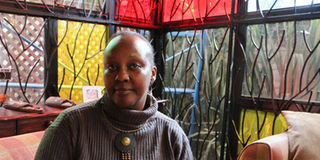The first Kenyan behind the Oscars

Judy Kibinge, filmmaker and founder of documentary film fund Docubox, was appointed to the Academy of Motion Picture Arts and Sciences voting class of 2017. PHOTO| FILE| NATION MEDIA GROUP
What you need to know:
- Filmmaker Judy Kibinge was appointed to the Academy of Motion Picture Arts and Sciences voting class of 2017, and will help select the next set of Oscar winning documentary movies.
- Judy had always known she wanted to get into the arts, but she had difficulty deciding her path.
- Judy says that some of the reasons why local film production is so slow on the uptake are distribution, piracy and funding.
- Following last year’s #OscarsSoWhite furore, Judy notes that her invitation is indicative of a change of tide in Hollywood.
Judy Kibinge, filmmaker and founder of documentary film fund Docubox, quit the advertising industry to work in film. This year, she was appointed to the Academy of Motion Picture Arts and Sciences voting class of 2017, and will help select the next set of Oscar winning documentary movies.
In the year 2000, Judy astonished many by walking away from a 10-year career in advertising. “I was at the height of my career. I was the first non-expatriate creative director in a multinational agency. I loved making and crafting adverts. But after 10 years in the corporate world, I was called by the need to tell stories,” she says.
Judy had always loved telling stories.
“At an early age, I (showed that I was) good at writing and drawing; visuals and words are important to me. I am very drawn to shape, form, light and visual things that look good.
If I hadn’t become a filmmaker, I would have become an architect or an interior designer.”
INVITATION TO JOIN THE OSCARS ACADEMY
Judy had always known she wanted to get into the arts, but she had difficulty deciding her path. “I wanted to become and architect but I was not great at math. And even though I drew and painted, I wasn’t a fine artist. So I ended up studying a course called design for communication media at the Manchester Metropolitan University. And then I stumbled into advertising.”
An invitation to join the Oscars Academy is a recognition of excellence. How did she get there? “Docubox has been supporting feature length (Kenyan) documentaries – and my goodness, they are works of art. Our grantees have taken their films to different markets around the world. People are amazed that this is coming out of Kenya. I believe that is one of the reasons I have been invited.”
Judy is not new the international film festival judging process. “By the time you are invited, you are expected to know the drill because you have possibly been in other voting situations,” she says.
“For instance I have been a judge at the most important documentary festival in the world – the International Documentary Filmfestival Amsterdam (IDFA). Also, at Docubox, we are constantly finding new filmmakers.”
“YOU CAN HAVE GREAT STORIES BUT IF YOU ARE NOT MAKING THEM… THEY’LL NEVER GET HEARD.”
Judy says that some of the reasons why local film production is so slow on the uptake are distribution, piracy and funding. “There’s not enough money been put into film, which is one of the reason why I started Docubox. I was tired of hearing filmmakers and people saying ‘but Africans have such great stories’.
Yes, you can have great stories but if you are not making them, if you don’t have the money to produce them, they’ll never get heard.”
Being invited to the Academy is an incredible honour for her as an African woman. “It’s fewer than 10,000 people from around the world. It sounds a like a lot of people but when you think about all the filmmakers in the world and the billions of people in the audience – when you scroll down the list of Academy members and you see all these amazing artists, and then you see the range and recognise the bar of excellence of those invited to vote, it is extremely humbling. It is, to me, a sign of good faith from the Academy that they have included so many more women.”
Following last year’s #OscarsSoWhite furore, Judy notes that her invitation is indicative of a change of tide in Hollywood. But she is also very ardent about bringing the focus back to local platforms.
“Without a real, concerted effort and real respect for local filmmaking, we are going to be confined to looking up at far way Hollywood. That’s why initiatives like Docubox and One Fine Day (which made Nairobi Half Life, and Kati Kati) that are growing Kenyan audiences, are far more important (to creating a Kenyan industry) than the Oscars.”
Her advice to aspiring filmmakers?
“It is hard,” she says without hesitation. “And not just in Kenya – it’s hard everywhere. Money and funds are shrinking. Broadcast money is shrinking. Netflix and the likes are exploding. How do you fit yourself into it and get yourself known as an individual? I think the only solution is to really understand that we need to create local demand. If we don’t grow local audiences, we are not going to create an industry where many people can make a living.”
In the meantime, Judy is jetting around the world, attending exclusive academy invitation screenings of emerging films.
“I am a new member so I can’t yet fully explain the process leading up to the Oscars night,” she says, “but all it is, is that you watch previews and you vote. It’s not complicated.” She is, nevertheless, in awe and gratitude at the whole experience. “I still wonder ‘how did I get here?’
I look at the people in my year – Oscar winners, some whom I know like John Akomfrah – and you know you are in good hands.”





